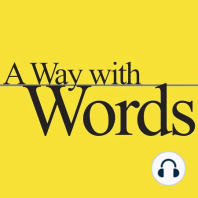52 min listen

A Louse in a Wrestling Jacket - 4 Oct. 2010
FromA Way with Words - language, linguistics, and callers from all over
A Louse in a Wrestling Jacket - 4 Oct. 2010
FromA Way with Words - language, linguistics, and callers from all over
ratings:
Length:
52 minutes
Released:
Oct 3, 2010
Format:
Podcast episode
Description
A California college student is campaigning for international scientific authorities to adopt the slang term hella- as an official prefix indicating a huge number. Will he succeed? Also, how to pronounce niche, the regional terms doppick and nixie, the origins of towheaded and frenetic, and a phrase familiar to many African-Americans, but little-known outside that community: I couldn't buy a louse in a wrestling jacket....Whether it's bytes of data or intergalactic distances, humans are accumulating ever more massive amounts of data. But how do we use language to describe such mind-bogglingly huge numbers? There's mega, as in mega-millions, and giga, as in gigabytes, but a California college student is urging international scientific authorities to adopt hella- as a prefix to indicate a huge number: 10 to the 27th power. What are his chances for getting this slang term officially adopted as a unit of measurement?Someone who's flaxen-haired is said to be towheaded. Martha explains what kind of "tow" is involved.Here's a variant of a phrase that's familiar to many African-Americans, but virtually unknown to most others: I'm so broke I couldn't buy a louse a wrestling jacket. What's its meaning and origin? It's also heard "buy a flea a wrestling jacket" or "buy a mosquito a wrestling jacket."Quiz Guy John Chaneski has a special inspiration for this week's puzzle: His wife, author Jennifer Michael Hecht, is one of five judges for the nonfiction category of the National Book Awards. He's crafted a quiz based on some of the 500 titles in contention.http://bit.ly/dmnW2TA veterinarian in Pennsylvania Dutch Country runs into some strange terms. What's wrong with a dog that's doppick, or a cat that's nixie? What does it mean to have your animal dressed?The pronunciation of the word niche has changed over the years.Grant and Martha talk more about the challenges dictionary editors face when trying to define numbers and colors. A descendant of the legendary Hatfield family of Appalachia remembers her grandmother saying, "Wish in one hand and tacky in the other, and see which fills up first." She wonders about the origin of this advice, and what the word tacky means in this case. Here's another: If wishes were buttercake, beggars would bite.The adjectives frenetic and frantic arise from the same linguistic root, but have slightly different meanings.Grant recommends the new book, The Story of OK: The Improbable Story of America's Greatest Word by Allan Metcalf.http://bit.ly/9rSSTCWhen we agree to make a decision later, we might say we're going to play it by ear. What's the origin of that phrase?--A Way with Words is supported by its listeners. Drop a few bucks in the guitar case: http://waywordradio.org/donateGet your language question answered on the air! Call or write with your questions at any time:Email: words@waywordradio.orgPhone:United States an Canada toll-free (877) WAY-WORD/(877) 929-9673London +44 20 7193 2113Mexico City +52 55 8421 9771Site: http://waywordradio.org/Donate: http://waywordradio.org/donate/Podcast: http://waywordradio.org/podcast/Forums: http://waywordradio.org/discussion/Newsletter: http://waywordradio.org/newsletter/Twitter: http://twitter.com/wayword/Skype: skype://waywordradioCopyright 2010, Wayword Inc.
Released:
Oct 3, 2010
Format:
Podcast episode
Titles in the series (100)
Bite the Wax Tadpole - 24 March 2008: Ad slogans and product names supposedly botched in translation, plus incent and incentivize. by A Way with Words - language, linguistics, and callers from all over